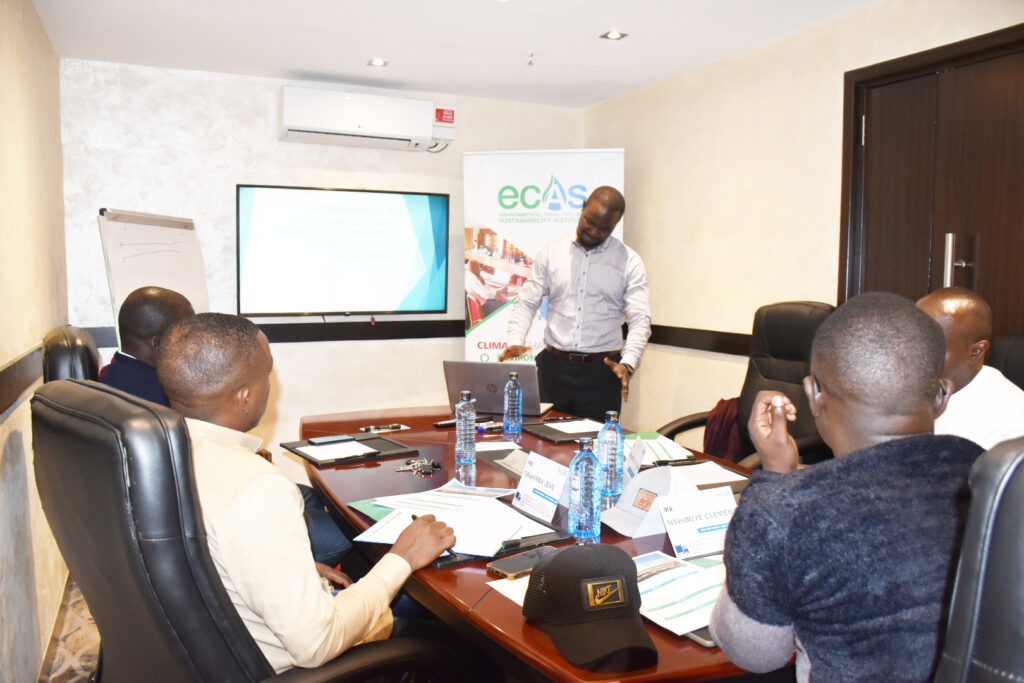
CONCEPT NOTE
INTERNATIONAL TRAINING ON RESOURCE MOBILIZATION AND FUNDRAISING FOR CLIMATE CHANGE AND ENERGY PROJECTS
COURSE BACKGROUND
With the increasing urgency to address climate change and energy sustainability, securing adequate funding and resources for related projects is a critical challenge. Many initiatives in renewable energy, climate adaptation, and environmental sustainability struggle due to limited financial resources, inadequate stakeholder engagement, and complex funding mechanisms. This course, offered by the Environmental Capacities and Sustainability (ECAS) Institute, is designed to equip professionals with the skills and knowledge needed to mobilize resources, secure funding, and build financial sustainability for climate and energy projects.
Participants will explore various financing models, including grants, public-private partnerships, carbon markets, green bonds, and impact investments, while also learning how to develop winning proposals, engage with donors, and leverage innovative financing mechanisms. The course integrates global best practices and case studies to help participants navigate the complexities of fundraising for climate-related initiatives and ensure their projects achieve long-term success.
COURSE OBJECTIVES OF THE TRAINING
By the end of the course, participants will be able to:
- Understand key funding sources for climate change and energy projects, including international funds, private investments, and philanthropic contributions.
- Develop effective resource mobilization strategies to secure financial and technical support.
- Design compelling grant proposals and business cases that align with donor priorities.
- Navigate climate finance mechanisms, such as the Green Climate Fund, Adaptation Fund, and carbon trading.
- Build and maintain strategic partnerships with donors, investors, and stakeholders.
- Utilize innovative financing tools such as green bonds, blended finance, and crowdfunding.
- Enhance financial planning and budget management for sustainable project execution.
WHAT YOU WILL LEARN
Upon completion of this comprehensive course participants will have a clear understanding of:
- Types of Climate and Energy Financing – Public, private, and blended financing sources.
- Grant Writing and Proposal Development – Key components of successful applications.
- Climate Finance Mechanisms – Accessing funds from international climate initiatives.
- Innovative Fundraising Strategies – Crowdfunding, green bonds, and carbon markets.
- Stakeholder and Donor Engagement – Building strong relationships for long-term support.
- Financial Planning and Sustainability – Ensuring project longevity through sound budgeting.
DURATION AND PROGRAM
TARGET PARTICIPANTS
This course is designed for professionals involved in climate change, renewable energy, and environmental sustainability who need to secure funding and manage financial resources effectively. It is ideal for project managers, NGO leaders, government officials, and development practitioners working on climate adaptation, energy, and environmental initiatives.
Additionally, financial analysts, corporate sustainability officers, researchers, and donor relations specialists will benefit from learning about grant writing, climate finance mechanisms, and innovative fundraising strategies. Whether new to fundraising or experienced in resource mobilization, participants will gain practical skills to secure funding and ensure financial sustainability for climate and energy projects.
TRAINING MODULES
| No | Module | Details | |
| 1. | Introduction to Resource Mobilization for Climate and Energy Projects |
|
|
| 2. | Climate Finance Sources and Mechanisms |
|
|
| 3. | Grant Proposal Writing and Fundraising Strategies |
|
|
| 4. | Public-Private Partnerships and Alternative Financing Models |
|
|
|
5.
|
Stakeholder Engagement and Donor Relations |
|
|
| 6. | Financial Planning and Budgeting for Sustainability |
|
|
TRAINING STYLE
This course employs a practical and interactive training approach to equip participants with real-world skills in fundraising, resource mobilization, and climate finance management. The sessions combine expert-led lectures, case studies, group discussions, and hands-on exercises to ensure a comprehensive learning experience.
Participants will engage in interactive workshops where they will develop and refine grant proposals, create fundraising strategies, and practice donor engagement techniques. Panel discussions with industry experts, investors, and successful fundraisers will provide insights into securing funding for climate and energy projects. Role-playing exercises and simulated donor pitching sessions will help participants build confidence in presenting their projects to potential funders.
Additionally, the course includes practical case studies from successful climate and energy projects, allowing participants to analyze real-world financing models and apply best practices. Networking opportunities with donors, investors, and sustainability professionals will also be incorporated to foster long-term connections and collaboration. Through this experiential learning approach, participants will gain the necessary skills to secure funding, manage financial resources effectively, and drive impactful climate and energy projects.
GENERAL NOTES
- Training manuals and additional reference materials are provided to the participants.
- Upon successful completion of this course, participants will be issued with a certificate.
- We can also do this as a tailor-made course to meet organization-wide needs. Contact us to find out more: info@ecasiafrica.org.
- Payment should be sent to our bank account before the start of training and proof of payment sent to: info@ecasiafrica.org.
ABOUT ECAS INSTITUTE
The ECAS Institute designs and delivers independent and targeted training, research, and consulting services. Our work focusses on climate change and resilience building, carbon markets, renewable energy, nature-based solution, biodiversity conservation, agriculture and food systems, We are located in Nairobi Kenya and work across the African region. We have implemented training and research assignments in Kenya, Tanzania, Uganda, South Sudan, Somalia, Malawi, Rwanda, Congo, and South Africa. Globally, we have supported our partners from the UK, Denmark, Italy, Sweden, Germany, and USA.

